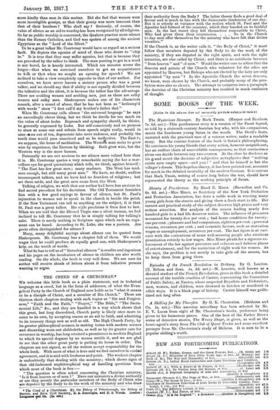THE CREED OF A CHURCHMAN.*
We welcome this little book as a plain statement, not in technical language as a creed, but in the form of addresses, of what the- Evan- gelical Party in the Church of England now holds as to "what it means to be a disciple of Christ, and a member of His Church." There are thirteen short chapters dealing with such topics as " Sin and Forgive. ness," "Faith and the Faith," "Prayer," "The Bible," "The Sacra- mental Life," &e., and they are handled in a way which shows that this great, but long discredited, Church party is likely once more to come to its own, by accepting reason as an aid to faith, and admitting to its treasury things new as well as old. The High Church Party, by its greater philosophical acumen in making terms with modern science and discarding worn-out shibboleths, as well as by its greater care for reverence in worship, has long retained a prominence in modern England to which its special dogmas by no means entitle it., and we are glad to see that the other great party is putting its house in order. The chapters are not signed, as all the writers accept responsibility for the whole book. With most of what is here said we find ourselvei in cordial agreement, and it is said with freshness and point. The weakest chapter is undoubtedly that dealing with the ministry; which shows signs of that old-fashioned unphilosophical way of handling questions from which most of the book is free :—
" The question is often asked concerning the Christian ministry, ' Is it from heaven or of men ? ' Have our ministers a divine authority or are they merely the particular members of the Body of Christ who are deputed by the Body to do the work of the ministry and who draw
• The Creed of a Churchmen. By the Bishop of Peterborough, the Bishop of Barrow, and Revs. Cyril Bardsley, E. A. Bturoughs, and E. S. Woods. Lmdoa: Leaman' tad Oa. Pa. 3344
their authority from the Body ? The latter theory finds a good deal of favour and is much in line with the democratic tendencies of our day. But it is utterly at variance with the notion which St. Paul and the Apostles had formed of the ministry, which they handed on to faithful men. In the last resort they felt themselves responsible to Christ, Who had given them their .commission. . . . So in the Church to-day men offer themselves for the ministry who have felt that divine vocation."
If the Church is, as the writer calls it, " the Body of Christ," it must follow that members deputed by this Body to do the work of the ministry, if they are deputed in the right spirit, and with the right intention, are also called by Christ; and there is no antithesis between " from heaven " and " of men." Would the writer care to affirm that the deacons and priests of the Church who volunteer for the office are appointed by Heaven, but Bishops who are elected by the laity are only appointed " by men " ? In the Apostolic) Church the seven deacons, we know, were chosen by tho Church, and probably many of the pres- byters were also so chosen. The attempt to compress into a paragraph the doctrine of the Christian ministry has resulted in much confusion of thought.


































 Previous page
Previous page